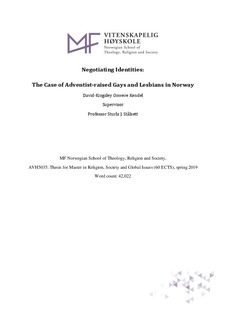Negotiating identities : the case of Adventist-raised gays and lesbians in Norway
Master thesis
Permanent lenke
http://hdl.handle.net/11250/2620555Utgivelsesdato
2019Metadata
Vis full innførselSamlinger
Sammendrag
Forming an identity in a religious environment that condemns homosexuality has posed a major challenge to many gays and lesbians. Realizing one’s homosexual identity under such circumstances often leads to a tension or identity conflict. In seeking to resolve or avoid conflict between their religious and sexual identities, gays and lesbians have applied different negotiation strategies.
This study explores the process of identity negotiation among religiously reared homosexuals within the framework of identity theory. The context for this study is the Seventh-day Adventist (SDA) Church in South Norway. Through in-depth interviews, I study the related experiences of ten homosexual1 informants raised in the Church, exploring how social ties and religious affiliation have affected their identity negotiation process. Based on a four-path model for conflict resolution strategies, I discuss how the strategies employed by the informants can be understood in terms of identity theory, focusing on the emerging themes in the interviews.
Based on the four salient themes of “within-ness,” moral acceptability, silence/avoidance, and the parental role, my thesis suggests an experienced notion of a hegemonic Adventist identity. Governing major and vital aspects of their social and psychological life, most informants make strenuous efforts to conform and reject/suppress their homosexual identity. Culminating in an identity crisis, most end up either rejecting their Adventist identity or seeking to integrate their homosexual and Adventist identities.
Using insights from Rappaport’s empowerment theory and Honneth’s theory of recognition, I discuss some normative implications of the findings for positive/healthy identity formation among homosexuals in the Adventist community. I conclude that the emergent themes of Adventist identity in the experience of the informants can be reframed as to create a safe place for gay and lesbian community members.
